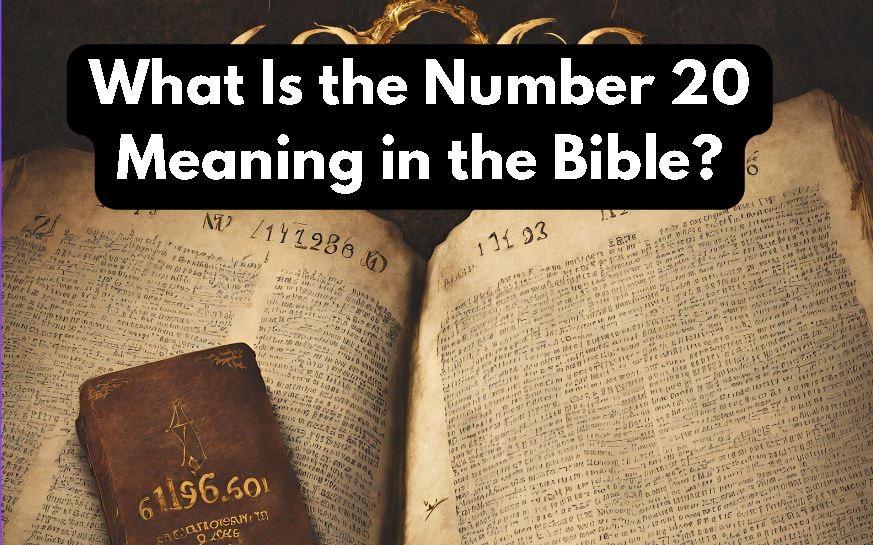The number 20 appears numerous times throughout both the Old and New Testaments in the Bible. More than just an arbitrary number, the frequent usage and connections to concepts like spiritual maturity, judgment, renewal, and the divine nature of God give 20 special theological meaning and symbolism.
A Number of Testing and Judgment
The number 20 comes up repeatedly in Bible stories dealing with a period of testing or judgment. For example, Genesis 18 highlights a dialogue between Abraham and God regarding the judgment coming upon the cities of Sodom and Gomorrah for their profound wickedness. Abraham asks if God would spare the cities if 50 righteous people lived there. God agrees, then Abraham barters all the way down to 10 righteous people. But ultimately, not even 10 righteous can be found.
The number 20 also surfaces in Exodus 20 with the giving of the Ten Commandments. This seminal passage lays out God’s moral law and standards for behavior and righteousness. The fact the Ten Commandments appear in Exodus 20 again links this number with judgment and testing against God’s holy standards. As Exodus 20 ushers in the Law, the number 20 takes on legal and judicial overtones.
Symbolizing Spiritual Perfection and Completeness
Why does 20 come up so frequently in relation to judgment? The root likely lies in the spiritual symbolism tied to the number. In Hebrew Gematria, the numeric system underlying Scripture, 20 is represented by the letter Kaph, picturing an open palm. The open, extended hand as a visual symbol speaks to the concepts of spiritual perfection and divine completeness.
The number 20 thus signals the fullness or completeness of something in a spiritual sense. This explains the connections to judgment, indicating the completeness of God’s judgment, as well as links to revival and spiritual fulfillment found throughout Scripture.
Important Time Periods and Spiritual Maturity
Key people and time periods in the Bible are also connected to the number 20, often signifying spiritual maturity.
For example, Numbers 4 highlights that Levites were eligible to start serving in the tabernacle once they reached 20 years old. The fact priestly duties could commence at 20 again points to spiritual maturity and completeness represented by this number.
Later, in 1 Samuel, the people demand a king, so God appoints Saul to rule over Israel. Saul reigns as king for 20 years until his disobedience leads to God stripping his kingship and anointing David as the next king. The span of Saul’s rule tied to 20 echoes the incomplete or deficient nature of his leadership.
Consistency From Old to New Testaments
The number 20 surfaces not only Genesis and Exodus, but in the time of the judges and prophets. The Bible notes Samson judged Israel for 20 years. The books of Kings detail crucial events in Israel’s history all tied to certain kings’ 20th year of ruling. Over and over again, anywhere from Abraham to the kings, 20 connects to key biblical events and themes.
This consistent significance of 20 continues in the New Testament Gospels as Jesus himself references and quotes from Exodus 20 and the Ten Commandments on multiple occasions. Whether used by Moses, the Prophets, or Jesus himself, the number 20 maintained symbolic meaning and spiritual connotations.
Numerology and Christology Connections
The strong symbolism of numbers in Scripture such as 12 and 40 gives special prominence also to the number 20. Numbers represent divine patterns, underscoring God’s supernatural design in Creation and human history.
Connections also exist between 20 and Christology, the study of Christ. In Hebrews, the writer uses over 20 different titles and names for Jesus highlighting his divinity. This seems intentional, linking Jesus again with spiritual perfection represented by 20. The Bereans are commended for examining the Scriptures daily to see that what Paul taught was true. As we search the Scriptures, we discover layers of meaning tied to God’s divine numeric patterns – significance that underlies the persistent biblical prominence of the number 20.
Summary: Number 20
In the end, the symbolic nature of numbers like 12, 40 and 20 in the Bible give them special theological meaning anytime they appear in Scripture. The number 20 specifically surfaces repeatedly, connected to judgment, spiritual maturity, divine completeness plus time periods, kings’ rules, and titles for Christ. This number 20 forms part of the supernatural numeric design God placed within the very fabric of Scripture.





